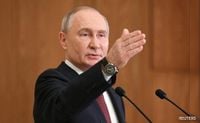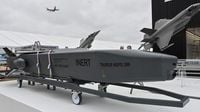As geopolitical tensions escalate in Eastern Europe, the United Kingdom has signaled its support for Germany's potential decision to supply long-range Taurus missiles to Ukraine. This development comes amidst rising concerns from Russia, which has warned that such a move could significantly escalate the ongoing conflict.
According to a report published by The Telegraph on April 16, 2025, British government sources confirmed that the UK would back Germany if it opts to provide Ukraine with the Taurus cruise missiles, capable of striking targets up to 500 kilometers away. This shift follows statements from Germany’s likely next chancellor, Friedrich Merz, who has expressed a willingness to send the weapons to Kyiv—a stark departure from the cautious approach of outgoing Chancellor Olaf Scholz.
In an interview with German state broadcaster ARD on April 13, Merz stated, “I have always said that I would do it,” referring to supplying Taurus missiles to Ukraine. He emphasized that European partners such as the UK and France are already supplying cruise missiles, namely Storm Shadow and Scalp, respectively. Merz underscored the need for Germany to align with its NATO allies, stating, “Our European partners are already supplying cruise missiles… The British are doing it, the French are doing it, and the Americans are doing it.”
The Taurus missiles, developed by MBDA Deutschland, are known for their precision and long range, making them suitable for targeting command centers, logistics hubs, and critical infrastructure deep within Russian-occupied territory, including the strategically vital Kerch Bridge that connects Crimea to mainland Russia. The UK’s endorsement appears to align with its broader policy of providing advanced Western weaponry to Ukraine. A British foreign policy official remarked, “We continue to work with our partners, including Germany, to equip Ukraine as best we can to defend its sovereign territory.”
However, the Kremlin has taken a starkly different view. Russian officials have repeatedly warned that the provision of long-range missiles to Ukraine would be considered a grave provocation, potentially leading to a significant escalation of hostilities. Foreign Ministry spokeswoman Maria Zakharova stated, “If Taurus missiles are used against infrastructure targets in Russia, this will be considered direct participation by Germany in hostilities on the side of the Kyiv regime.”
As tensions mount, outgoing Chancellor Olaf Scholz has been steadfast in opposing the transfer of the missiles, cautioning that such a move could “draw Germany directly into war with Moscow.” Even within Scholz’s center-left Social Democratic Party (SPD), there are concerns that the extended range and destructive capabilities of the Taurus missiles could provoke an unpredictable Russian response. Party leader Matthias Miersch suggested that Merz may reconsider his position once fully briefed on the security implications surrounding the Taurus system.
German Defense Minister Boris Pistorius, also of the SPD, previously described “many good arguments” against delivering the missiles, including national security risks and the perception of Germany as a direct belligerent in the conflict. CDU defense spokesman Roderich Kiesewetter acknowledged to The Telegraph that the missile delivery issue remains a “point of contention” in ongoing coalition negotiations between the CDU and SPD, which are expected to conclude with Merz becoming Chancellor on May 6, 2025.
If Germany decides to greenlight the Taurus deliveries, it would mark a significant evolution in NATO’s involvement in the Ukraine war. While the alliance has provided billions in weapons, intelligence, and logistical support, it has so far walked a tightrope to avoid direct confrontation with Russia. Merz’s potential policy shift, backed by the UK, could increase pressure on other European states to escalate their military support further.
From a military standpoint, Taurus missiles could dramatically improve Ukraine’s ability to disrupt Russian supply lines and command structures far behind the front. However, from a geopolitical perspective, they represent a high-stakes gamble that the Kremlin’s threats will not materialize into full-scale retaliation.
As Kyiv’s counteroffensives stall and Russian advances continue, calls for increased military aid are growing louder. Friedrich Merz may soon face one of the most consequential decisions of his chancellorship before it even begins. Should he authorize the Taurus deliveries, he would fulfill a campaign promise and align Germany more closely with its NATO allies. However, he would also risk inflaming tensions with Russia to new heights.
In a broader context, Russia has consistently criticized Western countries for supplying long-range weapons to Ukraine, arguing that Kyiv uses them to strike targets deep inside Russian territory. The Kremlin’s warnings underscore the delicate balance that NATO countries must navigate as they consider further military support for Ukraine.
Ultimately, whether this marks a turning point in Europe’s approach to the war or a step toward greater escalation will depend not only on Berlin’s final decision—but also on Moscow’s response to it. As the situation develops, the international community watches closely, aware that the stakes have never been higher.








